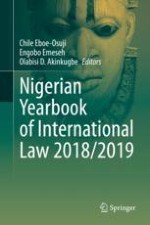2021 | OriginalPaper | Chapter
The Law’s Response to the Plight of Victims of Trauma in the Context of International Criminal Justice
Author : Daniel D. Ntanda Nsereko
Published in: Nigerian Yearbook of International Law 2018/2019
Publisher: Springer International Publishing
Activate our intelligent search to find suitable subject content or patents.
Select sections of text to find matching patents with Artificial Intelligence. powered by
Select sections of text to find additional relevant content using AI-assisted search. powered by
